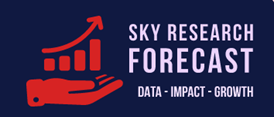- info@skyresearchforecast.com
Dengue vaccine: powerful bullet for the treatment of the dengue
- Publish Date: January 2024
Dengue is transmitted by Aedes aegypti mosquito. Continuously increasing population density and rising prevalence of insects borne diseases has acquired the attention of the various agencies on such types of diseases. According to the National Institute of Health, over 0.1 to 0.2 billion cases of dengue infections were diagnosed annually with the mortality rate due to dengue was above 20,000. Additionally, fatality rates of the disease are around 0.1% to 1% in hospitalized cases. According to the WHO, in 2016, over 3.34 million of people were suffering from dengue in the Americas, South-East Asia and Western Pacific. Patients with second dengue infection have different dengue serotype to the first are at increased risk for severe dengue. Which is the reason dengue vaccine must be tetravalent, for protection against all 4 serotypes virus?
The global dengue vaccine market is expecting a healthy growth of around 6.4% during the forecasted period.
The Americas is the major revenue contributor to the dengue vaccine market driven by the presence of huge patient population, high spending on the healthcare, presence of many leading players, and high awareness among the people. According to the WHO, in 2015, over 2.35 million cases of dengue were reported in the Americas alone, among which 10,200 cases were diagnosed as severe dengue causing 1181 deaths. Introduction of the Indo-U.S. Vaccine Action Program (VAP), has led to increasing the awareness regarding the immunization and vaccine-related research; driving the market growth in America. Europe holds the second leading position followed by the Asia Pacific.
The Asia Pacific is expected to be the fastest-growing region for the market owing to the presence of huge population and untapped opportunity. During the last few years, there is a significant increase in the prevalence of the dengue in developing Asian countries such as China, India and South-East Asia. For instance, in China, the prevalence of dengue was increased by 15-fold over last year. Additionally, in Taiwan, it was increased by 10 times. Continuously increasing awareness about the vaccinization and rising healthcare spending have driven the growth of the Asia Pacific dengue vaccine market.
Presence of huge players in the market has increased the presence of the dengue vaccines. Several companies are heavily investing in research & development to develop more advanced product and expand the product portfolio. In December 2015, the first product for dengue CYD-TDV (Dengvaxia) was licensed and is now approved by regulatory authorities in over 20 countries in Latin America, Asia, and Australia. WHO issued the position on the use of the product based on the recommendations guidelines provided by SAGE. To withstand in the increasing competition the companies are merging for research and incorporating a lot of efforts to develop the vaccines which will challenge the Sanofi Pasteur's in the dengue treatment. The competitor companies trying to launch safe and reliable vaccines as FDA has incorporated many restrictions for the use of the Sanofi Pasteur's.
Segment by Application
- Government institutions
- Hospitals
- NGOs
- Others
Key Players
- GlaxoSmithKline
- Merck Sharp & Dohme
- Sanofi
- Takeda Pharmaceuticals
- GeneOne Life Sciences
- Medigen Biologics
- Panacea Biotec
- Sun Pharmaceutical
- S NIH
- Vabiotec
